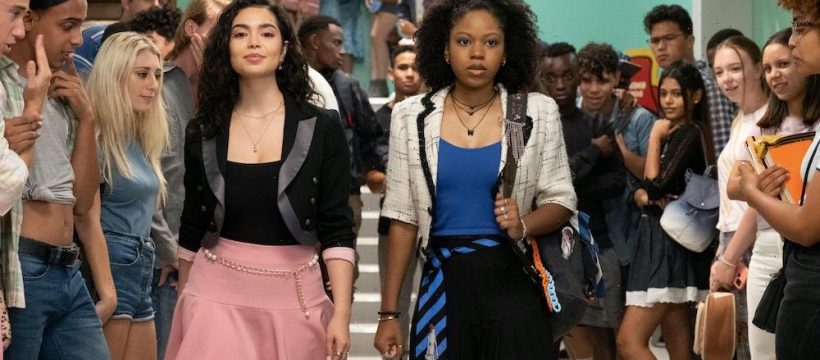In “Darby and the Dead,” the promise of its premise outweighs the delivered product. Director Silas Howard demonstrates his deft capabilities bringing an energetic irreverence and aesthetic buoyancy to the unfurling feature, which is centered on a tormented teen cajoled into helping a recently deceased mean girl get a new life in the afterlife. Unfortunately, despite the film’s undeniable charms and strong lead performances, the fabric it weaves frays as it wears on, undone by clunky character development, trite sentimentality and rushed resolutions.
High schooler Darby Harper (Riele Downs) sees dead people. But unlike Haley Joel Osment’s “Sixth Sense” character, she knows exactly how to help the deceased with their unfinished business. She’s turned it into a full-fledged job, paid only in gratitude, playing spiritual counselor to those she affectionately calls “Deados” who’ve passed away and are stuck in limbo. This special gift was bestowed on her at a young age when she was brought back from the dead after a drowning accident at the beach — one that claimed the life of her mother (Kim Syster). Since then, she’s chosen to shun the land of the living, becoming a sullen introvert, much to her caring father’s (Derek Luke) chagrin.
However, things change for our heroine once cruel, calculating classmate Capri (Auli’i Cravalho) falls in a puddle of water, unwittingly electrocutes herself with a straightening iron and dies. She reappears to Darby and is desperate to stay on earth for at least another month to see her massive, Coachella-inspired sweet 17 party take place. The duo must figure out a way for Darby to quickly climb the school’s social ranks in order to ensure the blowout bash will occur. This scheme plunges Darby into uncomfortable territory populated by the cheerleading squad and Capri’s grieving boyfriend James (Asher Angel). Adding to her troubles, Darby likes dorky transfer student Alex (Chosen Jacobs), whose mere presence would be unwelcome to the upper echelon. She’s then forced to balance her own wants with those of her caustic client.
Howard and screenwriter Becca Greene (working from a story by Wenonah Wilms) recycle a few overarching narrative conceits from the 2011 TV movie “Teen Spirit” and the 2021 TV movie “Afterlife of the Party,” where a vapid young woman relies on a frumpy friend to restore her sense of humanity and, in turn, remind the downtrodden of the robust life they should be leading. Only this time, the heroine breaks the fourth wall to make “Fleabag”-style asides to the camera. They also introduce us to the high school hierarchy in the same fashion as other teen-themed films, now contemporizing the cliques as future Real Housewives and slacker fifth-year seniors. Darby’s lunchtime companions, ghostly groundskeeper Gary (Tony Danza) and his desperate Deado pal Mel (Wayne Knight), add a touch of melancholic poignancy to the proceedings. And there’s a makeover montage that embraces what we love best about those stylish sequences, while also cleverly subverting the trope, mocking it with a dash of self-aware humor.
Yet that’s where the picture loses its threading. A tertiary subplot involving James, Darby and a rumored romance fails on every level due to its obvious mechanics and construction. Conflict resolution dealing with Darby’s distanced relationship with her father is dealt short shrift, as is the inevitable forgiveness granted by Alex after Darby’s shown him no real reason to earn back his grace. Worse, it clumsily wraps up Darby’s decades-long yearning to be visited by her mom. We can see what the grand gesture is meant to do for those involved on screen, but it drastically backfires for the audience. Not only is the outcome maddening, as it opens up multiple logic questions (even within the rules of the film), but it also does a complete disservice to one of the characters.
Where the narrative disappoints, Howard and his collaborators gift the picture with a delicately faceted identity within the aesthetic landscapes and aural soundscapes. Darby’s anxiety-riddled flashback of losing her mom feels tangibly evocative due to the camera’s fluidity and editor Kate Hickey’s assured artistry. Two friends talking on the beach at sunset, tenderly captured by cinematographer Ante Cheng, brings a burgeoning intimacy and immediacy to the dynamic duo. The soundtrack, curated by music supervisor Season Kent and mainly comprised of female recording artists (like The Breeders, Peaches, and Le Tigre), is there to anchor and amplify the protagonists’ feminist inner voices.
Downs and Cravalho are a pitch-perfect pair, finding an entertaining, melodic repartee amid the bickering and bluster. They both lob funny barbs back and forth, but Downs ups the ante, flexing her physical comedy muscles as Cravalho’s sassy specter manipulates physics to push her around. Cravalho is deviously wicked when in full-tilt mean girl mode, but equally captivating when tasked to summon vulnerability and pathos in less comedically broad scenes. When it comes to the supporting cast, Nicole Maines, who plays one of Capri’s snarky cheerleader besties, delivers the goods, getting practically all the film’s hilarious one-liners.
Though the filmmakers’ satirical points could stand to be sharpened, themes revolving around missing out and moving on are incorporated with care and craft, providing the two disparate protagonists with a shared, unifying internal struggle. These sentiments contain a modicum of resonance for the target market, regardless of a lack of new or unique commentary on the futile superficiality of popularity. While all that admirably gifts the picture with a bright effervescence, its blights dull its impact, leading to a slight case of rigor mortis.
Read More About:
Source: Read Full Article
